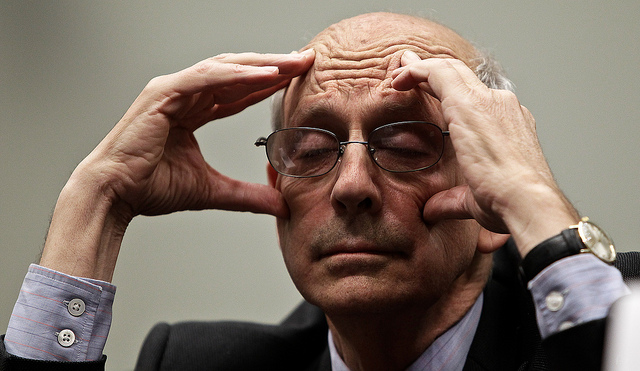Justice Breyer Needs an Originalist Law Clerk
McCutcheon v. FEC reveals fundamental differences between the Roberts Court majority and the dissenters about the First Amendment’s protection of political speech. The justices in the majority asserted the traditional view that the First Amendment is an individual right. In contrast, Justice Breyer argues for the McCutcheon dissenters that the First Amendment is in part a “collective right,” and thus government interests in favor of campaign finance regulation are not “to be weighed against the constitutional right to political speech. Rather they are interests represented in the First Amendment itself.” The latter view makes it much easier to upheld government restrictions that are targeted at resources to support speech at election time.
To support his view of the First Amendment as embodying a “collective right,” Breyer appeals to Founding-era statements that describe how speech connects a legislator with the sentiments of his constituents. But the materials he cites undermine his claims. First, he purports to demonstrate that James Wilson believed that “the First Amendment would facilitate a ‘chain of communications between the people and those to whom they have committed the exercise of the powers of government,” by quoting a snippet from a lecture by Wilson on the Constitution.
But the quote from Wilson does not appear in a discussion of the First Amendment, as Justice Breyer states, but in a discussion of the novelty and virtue of representative government, as opposed to “monarchical, aristocratical, and democratical” forms of government. Rejecting direct democracy, Wilson specifically notes in this very discussion the necessity of a legislator’s freedom to vote at variance with sentiments of his constituents.
Indeed, not only does this phrase have nothing to do with the First Amendment, the term “communication” is here used to mean voting, not expression. This meaning is clear from the next sentence in the passage, a sentence which Justice Breyer fails to quote: “The chain may consist of one or more links, but in all cases it should be sufficiently strong and discernible.” In the context of discussing the nature of electoral representation, Wilson posits that representation may be direct (one vote between the people and choice of representative) but may also be indirect like the Constitution’s own establishment of the electoral college (at least two votes between the people and the choice of representative). Justice Breyer has committed a cardinal sin of historical research by failing to understand the context of the words he quotes.
Breyer also cites in support James Madison, who stated that citizens could use their First Amendment rights to “publicly address their representatives” or “privately advise” them. Of course, this view is hardly a surprise: who could think that citizens could not use their right of free speech in this way! But Madison wrote these words in opposition to a proposed First Amendment provision that would have entitled citizens to instruct their representatives on how to vote.
Thus, Madison is actually arguing against a provision that would have required representatives to reflect more closely the sentiments of the people, thus undercutting Justice Breyer’s point that the government’s representatives may regulate expression to make what they claim is a closer connection between them and their constituents. And Justice Breyer fails to put Madison’s comments here in the larger context of Madison’s understanding of the nature of the First Amendment as an individual right that is akin to a property right.
Justice Breyer also claims to find support for his view about the meaning of the First Amendment in Rousseau and his notion of the general will. But Rousseau had little, if any, influence on any provision of the Constitution, let alone the First Amendment. And some of the Founders who did know him thought his theories “mad,” bad, and dangerous. For that reason, Rousseau has never been cited in a majority opinion of the Supreme Court. Thus, Justice Breyer’s effort to find support for a revolution in First Amendment doctrine is alternately misleading and silly. It might not be surprising to find these claims in a brief, but it is unsettling to read them in the Supreme Court reporter.


